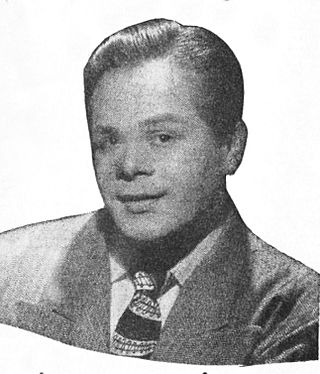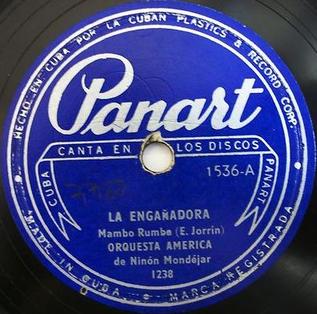
Rubén González Fontanills was a Cuban pianist. Together with Lilí Martínez and Peruchín he is said to have "forged the style of modern Cuban piano playing in the 1940s".
Charanga is a traditional ensemble that plays Cuban dance music. They made Cuban dance music popular in the 1940s and their music consisted of heavily son-influenced material, performed on European instruments such as violin and flute by a Charanga orchestra.. The style of music that is most associated with a Charanga is termed 'Danzón', and is an amalgam of both European classical music and African rhythms.

Orquesta típica, or simply a típica, is a Latin American term for a band which plays popular music. The details vary from country to country. The term tends to be used for groups of medium size in some well-defined instrumental set-up.

Jesús Valdés Rodríguez, better known as Chucho Valdés, is a Cuban pianist, bandleader, composer and arranger whose career spans over 50 years. An original member of the Orquesta Cubana de Música Moderna, in 1973 he founded the group Irakere, one of Cuba's best-known Latin jazz bands.

Ibrahim Ferrer was a Cuban singer who played with the group Los Bocucos for nearly forty years. He also performed with Conjunto Sorpresa, Chepín y su Orquesta Oriental, and Mario Patterson. After his retirement in 1991, he was brought back in the studio to record with the Afro-Cuban All Stars and Buena Vista Social Club, in March 1996. He then toured internationally with these revival groups and recorded several solo albums for World Circuit, before his death in 2005.
Orquesta Aragón is a Cuban musical band formed on 30 September 1939, by Orestes Aragón Cantero in Cienfuegos, Cuba. The band originally had the name Ritmica 39, then Ritmica Aragón before settling on its final form. Though they did not create the Cha-cha-cha, they were arguably the best charanga in Cuba during the 1950s and 1960s. Their trade-marks included high-class instrumentalists playing in tight ensemble style, and rhythmical innovations which kept their sound up to date. Over the years they progressed from their start as a danzoneria to play a wider variety of styles, danzón, then cha-cha-cha, then onda-cha, pachanga and son fusions. They still perform today, based in Havana.
Yumurí y sus Hermanos is a Cuban band led by Moisés Valle (Yumurí) since September 1992.

Felipa Graciela Pérez y Gutiérrez, known by the mononym Graciela, was a Cuban-born American singer of Cuban music and Latin jazz.
Irakere is a Cuban band founded by pianist Chucho Valdés in 1973. They won the Grammy Award for Best Latin Recording in 1980 with their album Irakere. Irakere was a seminal musical laboratory, where historic innovations in both Afro-Cuban jazz and Cuban popular dance music were created. The group used a wide array of percussion instruments like batá, abakuá and arará drums, chequerés, erikundis, maracas, claves, cencerros, bongó, tumbadoras (congas), and güiro.
Richard Egües, nicknamed "la flauta mágica", was a Cuban flautist and musician, one of the country's most famous artists. Egües was a member of the Orquesta Aragón band which he joined in 1955. He was also a strong supporter of the Cuban Revolution. A few days before he died, Richard Egües stated "I would give my life for him", referring to the Cuban President Fidel Castro, who was very sick at the time.
Cha-cha-chá is a genre of Cuban music. It has been a popular dance music which developed from the Danzón-mambo in the early 1950s, and became widely popular throughout the entire world.

Elena Burke was a revered and popular Cuban singer of boleros and romantic ballads.

Antonio Abad Lugo Machín was a Spanish-Cuban singer and musician. His version of El Manisero, recorded in New York, 1930, with Don Azpiazú's orchestra, was the first million record seller for a Cuban artist. Although this was labelled a rhumba, it was in reality a son pregón, namely, a song based on a street-seller's cry.
Abelardo Barroso Dargeles was a Cuban bandleader and singer, the first sonero mayor to be recognized as such by the Cuban public.

Miguelito Valdés, also known as Mr. Babalú, was a renowned Cuban singer. His performances were characterized by a strong voice and a particular sense of cubanismo.
Ramón Quián, better known as Monguito "El Único", was a Cuban vocalist, bandleader, producer and composer. An Afro-Cuban sonero, he had a simple improvising style with a distinctive nasal voice.
La Palabra is an American bandleader, singer-songwriter, pianist, record producer, and arranger, known for his versatile approach to music, particularly his invention of the Salsa romantica Latin music genre and his signature style of Afro-Cuban-influenced, sensual Latin jazz.
Orquesta Broadway was an American mid-1960s/late 1980s New York-based salsa band. They issued almost 20 albums between 1964 and 1987.

"La engañadora" is a song written by violinist Enrique Jorrín and first recorded by Orquesta América in March 1953. Shortly after its release it became Panart's biggest-selling single. It is widely considered the first cha-cha-cha and one of the most influential Cuban songs.

Harvey Averne has been described as "one of several prominent Jewish Americans in New York's bustling Latin music scene."









